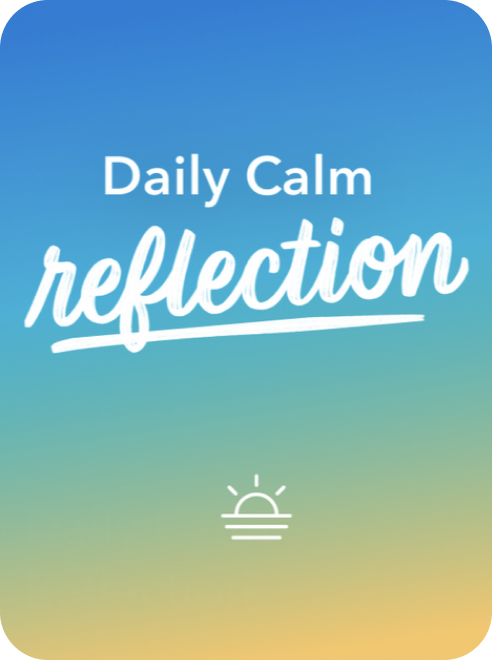Cultivate a grateful mindset with Calm's gratitude check-in
Develop a daily gratitude practice by writing down three things you’re grateful for: everything from the bigger things that are easier to notice, to the small day to day things we often overlook.
Start today with Calm’s Gratitude Check-in. Taking time to contemplate and record what you're thankful for is powerful. Research has shown that translating our ideas into written language helps organize them and deepen their resonance.
Many studies have shown that gratitude journaling also has physiological benefits. One in particular from U.C. San Diego, showed that just 5 minutes a day of gratitude journaling for an 8-week period reduced the risk of heart failure among at-risk patients. As Meredith Pung, the co-author of the study, puts it: “Grateful contemplation gives the heart a physiological break. While you’re gratitude journaling, the parasympathetic activity is putting the breaks on, and slowing down the heart rate.”
Explore all of Calm’s daily check-ins:
Here are a few tips from Calm’s Head of Mindfulness, Tamara Levitt, to make your gratitude practice more impactful:
Do this practice at the same time each day – if you can. Being consistent helps establish a daily habit.
Avoid falling into gratitude fatigue, which can occur when we list the same things each day, in the same way. When your list gets repetitive, it begins to feel like an empty recital. So mix it up and keep it fresh. Get as specific as possible. And look for new angles on recurring themes, finding different ways of expressing your acknowledgments.
Let your writing flow naturally without too much thought. Don’t worry about forming impeccable sentences. Let your mind wander fluidly as you write. The point is not to write an essay, but rather to channel gratefulness from the heart.
Expect that this practice will take time to work its magic. At first, it may be hard to think of things to be grateful for, and difficult to actually feel the words as you write. Simply start wherever you are, with whatever is right in front of you.
What we find is that as our practice grows, we begin noticing all the tiny things, we normally overlook. Suddenly we begin to see rivals as teachers, and pain as wisdom. We’re able to recognize lessons within setbacks and gifts within misfortunes. And a day may even come when the thing you’re most grateful for, is gratitude itself, because of how it’s transformed your life.
Learn more in our Calm Masterclass, Gratitude.
Calm your mind. Change your life.
Mental health is hard. Getting support doesn't have to be. The Calm app puts the tools to feel better in your back pocket, with personalized content to manage stress and anxiety, get better sleep, and feel more present in your life.





